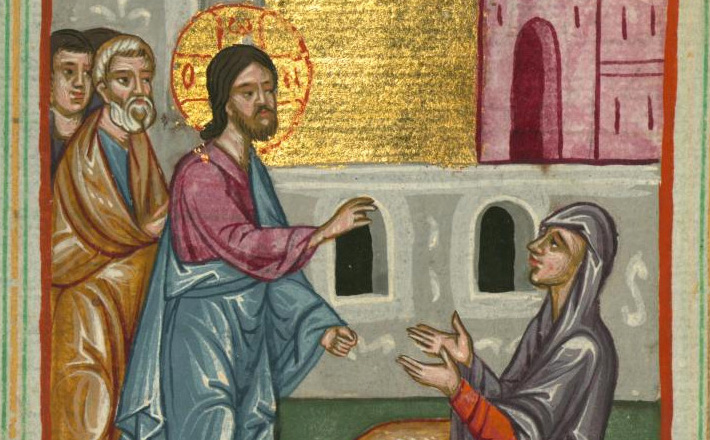Commentary on Romans 11:1-2a, 29-32
A cursory reading of Romans might lead one to think that chapters 9-11 are a tangent or insertion unrelated to the rest of the letter.
A more careful reading, however, leads to a different conclusion. At the beginning of the letter, Paul states that the gospel is “the power of God for salvation to everyone who believes, to the Jew first and also to the Greek” (1:16). Although the gospel of salvation is “to the Jew first,” it becomes apparent that a majority has not believed.
Paul’s explanation of the gospel through the first half of the letter culminates in chapter 8 with the assurance of God’s irrevocable promises to his people: “We know that for those who love God all things work together for good, for those who are called according to his purpose” (verse 28). Does Paul include Israel among those who are “called”? Does Israel receive this assurance?
Or, is God in the business of revoking promises? Some of Paul’s audience might wonder how firm is the foundation upon which they stand. Others might find a reason to boast, thinking that they as Gentiles have replaced Israel in God’s plan. For these reasons, Paul must make a case that God’s promises to Israel remain intact.
Romans 11:1-2a and 29-32 frame chapter 11. In verses 29-32, Paul reaffirms the point with which he starts: God has not rejected his people because God’s promises are irrevocable.
The question in verse 1 arises from the subject matter at the end of chapter 10. Paul has establishes that Israel cannot plead ignorance because the good news has been preached to them through the prophets and the writings (10:14-21). Israel has not understood the message it has received and has been disobedient. This leads to the question in 11:1, “Has God rejected his people?” The logical force is, “God has not rejected his people, has he?” Paul answers himself, “By no means!”
Paul does two things to buttress his answer. First, he gives himself as a proof of God’s faithfulness. He lists his credentials as an Israelite in verse 1b and concludes that, “God has not rejected his people whom he foreknew” (verse 2). Paul’s point is that if he has believed, God has not rejected his people. His statement alludes to a line in 1 Samuel 12:22.
In that context, Israel has asked for a king, signalling that they have forsaken God. Samuel prays for them and assures them that that, “the Lord will not forsake his people.” This recalls Paul’s earlier argument in 3:1-6, particularly, “What if some were unfaithful? Does their faithlessness nullify the faithfulness of God? By no means!” (verses 3-4a).
Second, Paul grounds his answer with a story about Elijah (11:2b-6; see 1 Kings 19:1-18). King Ahab has killed God’s prophets. Elijah escapes, dejected because he is the only one remaining who has refused to worship Baal. But God promises Elijah to preserve a remnant of 7,000 Israelites who refuse idolatry. Here is a pattern for the way God shows faithfulness to Israel by preserving a remnant by grace.
These verses are part of a larger section in which Paul addresses Gentiles (verse 13). He has told his Gentile audience not to boast over Jews who have been cut off from the metaphorical olive tree because of unbelief, because they too may find themselves in the same position (verses 13-24). No one has a ground for boasting, because all stand before God on the basis of grace.
Most immediately, the section in which our text fits begins with verse 25, in which Paul warns his audience not to be wise in their own eyes. God’s dealing in the work of salvation is a “mystery,” because Israel’s unbelief somehow plays a role in God’s plan to redeem Gentiles (verses 25b-27).
Paul’s argument in chapter 11 comes to a head in verses 28-32. A disparity exists in that Israel has the status of enemy with regard to the gospel because of unbelief; but beloved with regard to election “for the sake of their forefathers,” that is, because of the promises of God (verse 28; see 9:1-6). The next verse gives the basis for their beloved status: “for the gifts and calling of God are irrevocable.”
Paul solves this disparity by envisioning Israel’s disobedience as both purposeful and temporary. It is purposeful as part of God’s plan for the salvation of Gentiles (verse 30). It is temporary because it ends when faced with widespread Gentile belief (verse 31). God uses unlikely circumstances to build the church: Gentiles believe when many in Israel turn away; then many in Israel believe when provoked by Gentile belief. In Paul’s estimation, God accomplishes salvation of “all Israel” through the reciprocal movements of Jews and Gentiles.
These reciprocal movements look ahead to practical themes of later chapters. God works among Jews and Gentiles in salvation such that no one may boast, be arrogant (11:7) or wise in their own conceits (11:25). Then, as Jews and Gentiles live out their faith with one another, no one may think more highly of himself than he ought to, but must use his gifts humbly in a body with many members (12:3-8). No one may pass judgment on another or cause another to stumble, but must live to please his neighbour rather than himself (14:1-15:7).
Ultimately, these reciprocal movements look to God, because Paul ends in worship (11:33-36). He envisions all God’s people together worshipping God in view of God’s faithfulness and mercy. In fact, the whole letter moves in this direction: “May the God of endurance and encouragement grant you to live in such harmony with one another in accord with Christ Jesus, that together you may with one voice glorify the God and Father of our Lord Jesus Christ.” (15:6).
Perhaps there are ways we can reflect such reciprocal movements as we consider the “other” in our understanding of salvation, practical living, and worship.


August 17, 2014